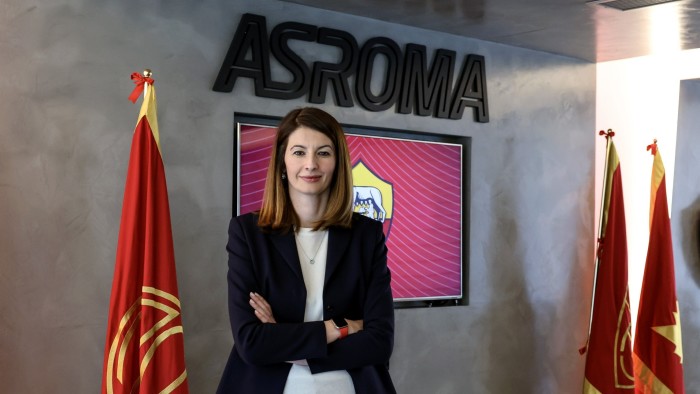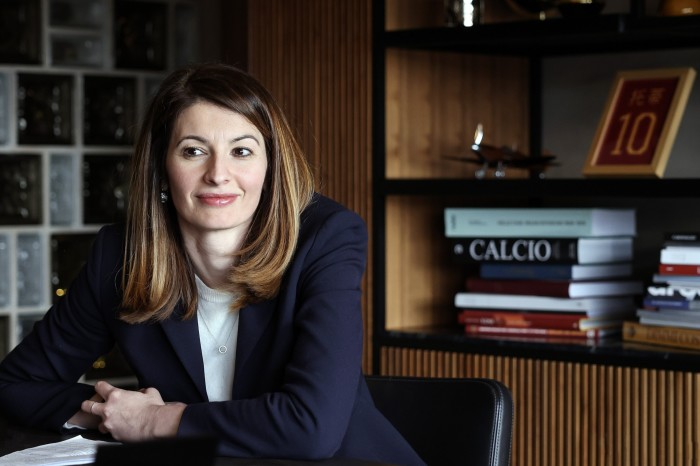Lina Souloukou: in the spotlight at the top of European football

Roula Khalaf, Editor of the FT, selects her favourite stories in this weekly newsletter.
Few places can rival Piraeus, the port of Athens, for history. But, within months of stepping down from Greek football club Olympiacos, Lina Souloukou had relocated to another historic European city. Souloukou, a former youth national volleyball player who specialised in sports law at university, was named chief executive of AS Roma last April and moved with her young family to the Eternal City.
Speaking at the football club’s Trigoria training centre hours before February’s Europa League tie against Dutch side Feyenoord, the 40-year-old talks about her rise to one of the most senior posts in European football.
Greek-born Souloukou is not one for staying in her comfort zone. At Olympiacos, owned by shipping magnate Evangelos Marinakis, she became the first diversity representative at the European Club Association, a membership organisation for football teams and an influential force in the game.
The ECA was a crucial arena for Souloukou, who joined the board as an observer and learned first-hand from movers and shakers in European football. It was there she met Daniel Friedkin, the Texas-based billionaire who bought Roma in a deal worth €591mn almost four years ago.
“Olympiacos is by far the best club in Greece, it’s a great honour being a Greek working there,” Souloukou says. But witnessing the achievements at the ECA, and the challenges of European football, made her want to “explore this new adventure outside Greece”.
“It’s evident that it’s a male-dominated industry — not only football, sports in general,” she adds. “But I’ve never really thought of that as a barrier or something that could be a problem.”
Under the Friedkins, who have invested heavily, Roma’s men won the inaugural Europa Conference League in 2022 and finished runner-up in the Europa League in 2023. Souloukou also credits the Friedkins with investing in the women’s team, which won its first Serie A title in 2023, and calls on others to follow suit. “The audience is growing, the attention is growing, the level is improving,” she says. “This is an opportunity. If someone cannot actually feel that . . . they will probably lose the opportunity to grow.”

Roma already has the history and tradition: its badge is a she-wolf, invoking the myth of city founders Romulus and Remus. Souloukou’s challenge, however, is setting the club up for the future.
José Mourinho, the Portuguese coach who led the club to those European successes, was sacked in January after a disappointing run. Some fans shed tears as he drove away from Trigoria, but the Friedkins replaced him with Roma legend and Italian World Cup winner Daniele De Rossi, who has won eight of his 10 first competitive matches in charge, including Roma’s 4-0 win over English Premier League side Brighton & Hove Albion in March.
Off the pitch, Roma says it has met financial targets set by Uefa, the European governing body, to comply with regulations. The club cut its pre-tax loss to €99mn in 2022/23, from almost €219mn a year before, as revenues jumped by more than a third to €277mn, including gains on player sales of €47mn. Operating costs fell, thanks in part to lower player salaries.
Souloukou, who started after the Uefa settlement, is now targeting financial sustainability and elite football domestically and in Europe. “The Friedkin family . . . see themselves as custodians of an institution loved by the fans, and want to make it sustainable and stronger,” she says. “It is much more than a business.”
Roma faces difficulties beyond its control, though. Serie A, Italy’s top football league, lags behind rivals such as the English Premier League or Spain’s La Liga in revenues and global audience.
For Roma, like many Italian clubs, the problem is exacerbated by not owning its stadium. Italy’s stubborn bureaucracy has made it hard for Italian teams to build modern facilities and develop an attractive broadcast product and increase match day revenue.
However, the Friedkins have plans for a new stadium, and Roma is “working very closely with the municipality” and other stakeholders, Souloukou says. A modern stadium is key to financial sustainability, but she emphasises the effect on the club’s top priority: the fans, as well as the city. “It’s really important to have a stadium that is their home,” she says. “How much Roma means in their everyday life is something you only feel when you live in this great city.”
Distractions are never far away, though. Roma recently dismissed claims that it was interested in joining a revamped European Super League, the breakaway competition mooted by Real Madrid and Barcelona. “We are open to reforms and inclusiveness, but always within the traditional structures of European football,” says Souloukou.
Another force for change in world football is Saudi Arabia, which has paid big money to attract famous players to its domestic league and sponsor European clubs. Souloukou says Roma is “really happy” with its partnership with Riyadh Season, a government-backed entertainment initiative whose brand features on the club’s shirts.
But she bats away rumours of a Saudi takeover: “[The Friedkin family] are here to stay. They’re truly loyal to their commitment to the fans and they have always been very respectful of the history of the club.”
It is time to head downstairs, and she glides from English into Italian as the players appear for their prematch meal. Paulo Dybala, fleet-footed Argentine World Cup winner, stops to chat with her; captain Lorenzo Pellegrini shares a joke. Notably, the players and Souloukou all wear the same determined look ahead of a must-win match.
A few hours later, Feyenoord has taken an early lead, and the Stadio Olimpico falls into a silence so solemn it would be the envy of Rome’s holy sites. Souloukou, watching from the executive seats, appears composed. She and the Roma fans do not wait long for an equaliser from the captain, but full-time comes without a winner.
In the deciding penalty shootout, the Roma fans greet the opposition players with an almost unbearable cacophony of jeers and whistles. Two Feyenoord players miss, Roma wins, sparking wild celebrations and singing of Grazie Roma.
It is an ordeal, yet it also evokes the Roma CEO’s response to how she handles the pressure. Unable to affect proceedings on the pitch directly, she emphasises that it is not a “solo” act but a team effort.
“This is football. Once every week, or twice per week, you are in the spotlight but at the same time the only answer to that is to be united with the owners, your coach, players and fans,” she says.
Win a free EMBA
The FT is launching its annual Women in Business essay competition in partnership with the 30% Club and Henley Business School. The prize is a fully funded place on Henley’s part-time Executive MBA programme starting from October 2024.
This year’s question is: ‘Will Artificial Intelligence (AI) be a help or a hindrance to women achieving greater representation in leadership?’
The deadline is May 28. More information: hly.ac/WiLscholarship

Comments